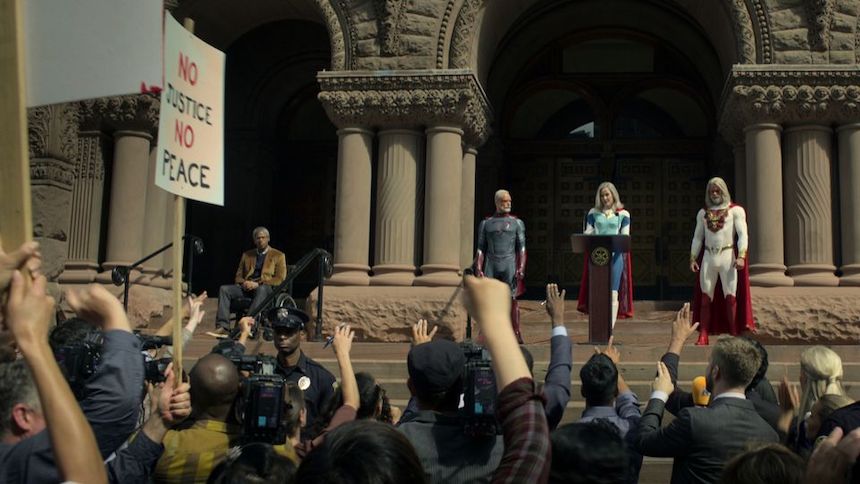Review: JUPITER'S LEGACY, Every Superhero Wants To Rule The World
Josh Duhamel, Ben Daniels and Leslie Bibb star in the action-adventure series, now streaming on Netflix.

With Marvel’s near-absolute dominance over the superhero space on screens unlikely to end or even stall in the foreseeable future, cable/streaming competitors — chief among them, the DCEU and its perpetual second place status — have been left scrambling to grab market share and satiate consumers of superhero-themed content with a seemingly insatiable hunger for escapist power fantasies regardless of that content's connection to preexisting intellectual property or origin as part of a semi-obscure, limited-run comic-book series.
With the possible exception of Amazon Prime’s adaptation of Garth Ennis and Darick Robertson’s satirical, ultra-violent comic-book series, The Boys, nothing else has managed to leave even a minimal impression on the superhero genre or pop culture itself. Not for want of trying, of course, as Netflix’s eight-episode adaptation of Mark Millar (Kick-Ass, Wanted, Red Son) and Frank Quitely’s (All-Star Superman, The Authority, New X-Men) 2013 superhero series, Jupiter’s Legacy, hopes to duplicate and/or imitate. Spoiler alert: It doesn’t, but it comes close.
Jupiter's Legacy centers primarily on Millar’s version of the First Family of (F*cked-Up) Superheroes, the aptly, if all too obviously, named, Sampsons. Led by Sheldon/The Utopian (Josh Duhamel), a Superman stand-in/analogue born at the turn of the 20th century and thus, a living artifact of a far more conservative, reactionary era, the Sampsons also include Sheldon’s wife and superhero partner, Grace/Lady Liberty (Leslie Bibb), their two, twenty-something children, Chloe (Elena Kampouris, a stand-out), a celebrity rebel without a cause or a superhero costume, Brandon Sampson/The Paragon (Andrew Horton), the Utopian’s chosen successor, and Sheldon’s older brother, Walter/Brainwave (Ben Daniels).
The first episode deftly outlines the intergenerational/superhero family conflict at the heart of Jupiter's Legacy, with Sheldon on one side of the continental divide, rigidly arguing for the “Code” (no killing, no interference, decisions determined by mercy, not retributive justice) and Brandon, the nominal leader of twenty-something superheroes who sees the Code as outdated at best and dangerous at worse, a reaction both to Sheldon’s old-school, comic-book values and a morally grey world where saving the lives of innocents and other superheroes should take precedence over capturing super-powered villains and allowing the criminal justice system to handle their fates. Walter and later Grace fall somewhere in the middle of the debate, with both recognizing that flexibility and maybe even possible direct intervention (i.e., in politics) might be preferable to inaction.
Anyone with even a passing familiarity with the history of comics will immediately grasp that the central conflict in Jupiter’s Legacy isn’t anything new or particularly original. It’s practically as old as superhero comics. When Sheldon-as-The-Utopian and Walter-as-Brainwave up the issue of intervention, specifically intervention in a divided country (i.e., ours) or more clearly, World War II, they’re rehearsing and repeating age-old “what if?” arguments that usually end with a hand-wave or shoulder shrug, but obviously won’t in Jupiter’s Legacy, leaving the superhero characters with a choice between benign non-intervention except in exigent cases like in-the-moment supervillain crimes or a benevolent dictatorship unlikely to remain benevolent for long.
While the remainder of Jupiter’s Legacy dances around the superhero question, more often than not, it pushes it into the background to focus on secondary characters and their secondary stories or — because it’s obligatory for any streaming series to follow the exact same template or structure regardless of story or thematic needs — interwoven, momentum-stalling flashbacks set before, during, and after the stock market crash of 1929, Sheldon, Grace, Walter, their mutual friend, George Hutchence (Matt Lanter), Fitz Small (Mike Wade), an ex-employee of Sheldon and Walter’s, and how their acquired their superpowers, formed a Justice League analogue, the Union of Justice, and how, eventually their grand plans to save the world while wearing spandex and capes went predictably sideways.
Netflix generally spares little expense production-wise and Jupiter’s Legacy is no different in that regard. High production values dominate the extensive ‘30s-set scenes and to a lesser extent, the modern ones, though the occasional visual effects shot looks rushed and/or under-rendered, especially during superhero fight scenes that require a mix of wire-work, stunts, and digital add-ons.
Tipping its intention to equal, if not better, The Boys and its controversial approach to ultra-violence onscreen, Jupiter’s Legacy leans heavily into depicting bodily dismemberment and all-around gore. The first episode ends with young and old superheroes fighting a Darkseid- or Thanos-inspired supervillain open field. Not everyone survives, though the deaths of characters we either just met or never met at all tends to have little emotional impact.
Those brutal, if abrupt, superhero deaths, however, serve to deepen the conflict between superhero father and superhero son, further fracturing an already fraught relationship, and sending them in opposite directions, each one convinced of the rightness of their beliefs and actions, each one convinced of the other’s wrongness in confronting or defeating super-villainy. Even as it simmers and boils to an inevitable conclusion (spoilers not applicable for anyone who’s read the comics), it’s grounded in relatable, real-world intergenerational conflict between clashing expectations, ideals, and all too often, ideology.
Jupiter's Legacy is now streaming on Netflix.
Jupiter's Legacy
Writer(s)
- Brian Gunn (screenplay)
- Mark Gunn (screenplay)
- Mark Millar (comic book)
Cast
- Anna Akana
- Tyrone Benskin
- David Julian Hirsh
- Jess Salgueiro







